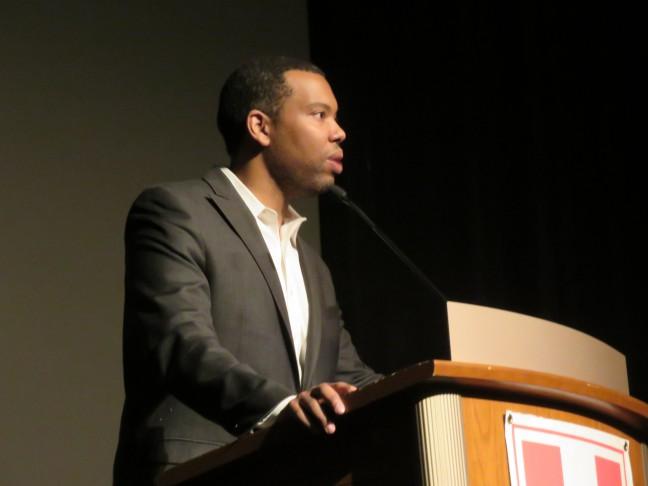The author Ta-Nehisi Coates said on campus Tuesday that the relationship between black Americans and their country comes down to one concept: plunder.
Coates, who wrote an award-winning piece calling for reparations for slavery, spoke as part of the Distinguished Lecture Series at the University of Wisconsin’s Memorial Union.
Coates, a columnist at The Atlantic and author of “The Beautiful Struggle: A Father, A Son, and an Unlikely Road to Manhood,” quoted a passage from philosopher John Locke, summoning the image of an armed thief looting a person of their properties.
“What is my remedy against a robber who has so broken into my house?” Coates asked. “This is the question of African-American history.”
Coates’ proposed answer to this question is reparations, providing payments to descendants of black American slaves to compensate them for the forced labor of their ancestors.
Black experience in America has been tainted by the initial and continued economic exploitation of that population, Coates said.
“The great feature of black people’s relationship to their country is not one of their country being rude to them, not merely being impolite to them, it’s a question of their country extracting resources from them,” he said. “And a period of 250 years of enslavement in this country is nothing more than a period of wealth theft, over and over and over again, made legal.”
Coates followed this concept of wealth theft through history, citing Jim Crow laws and practices like sharecropping as continued and modified forms of economic exploitation of black Americans.
Coates also said the mid-20th century expansion of home ownership was another means of extraction that drew tax money from black citizens and excluded them from ascending to the newly-bolstered middle class.
Bringing his case to the contemporary era, Coates said this exploitation continues through mass incarceration of black people, and, citing the recent U.S. Department of Justice investigation of the Ferguson municipality, through direct citations and criminal fines levied on black communities.
“We didn’t get here because people decided to wear baggy jeans,” Coates said. “We didn’t get here because there weren’t enough fathers in the community. We didn’t even get here because of black on black crime, whatever that is. Black on black crime is a result of how we got here; it’s a symptom of where we are.”
Through his recounting of the history of America, Coates cited the evolution of “whiteness” as defined by slave codes, updated over time as the role of slavery in the United States economy expanded.
It is this utilitarian, economic and ultimately exploitative rendering of identity that Coates said he sees as the major impediment to establishing a system of reparations.
“The problem with reparations isn’t the cash,” Coates said. “The problem with reparations is that they destroy American identity as most people like to talk about it.”













